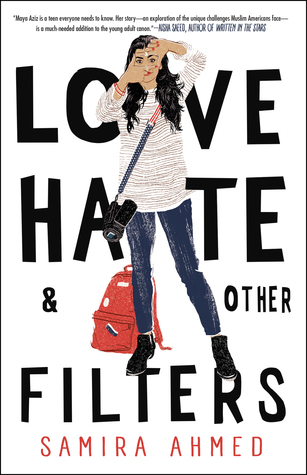“Love Hate & Other Filters” does not live up to my expectations

In “Love Hate & Other Filters,” Ahmed tells the tale of a Muslim American teen in a small town, and the choices she must make about her future.
March 13, 2018
After reading “The Hate U Give” by Angie Thomas, I sought out similar young adult novels claiming to take on serious problems affecting the world. In “Love Hate & Other Filters,” author Samira Ahmed attempts to tackle Islamophobia.
“Love Hate & Other Filters” was published on Jan. 16 of 2018, and tells the story of American-born Muslim Maya Aziz, and the struggles that she faces during the final months of her senior year at Batavia High School in Illinois.
All Maya wants is to go to New York University, become a documentarian, fall in love and make her parents happy. Unfortunately, this is almost impossible. Her parents follow outdated Indian customs and would rather have her go to a nearby community college than go off to a bustling city so far away to pursue a “dead-end career.” But when her long-time crush starts showing interest in her and her parents seem as if they will be open to the idea of New York, Maya thinks that things couldn’t get any better, and she was right. They got worse. A suicide bomber suddenly attacks in Springfield, Illinois and it’s 9/11 all over again. Being the only Muslim in her small town and sharing the same last name as the suspected bomber only serves to complicate her life further.
This novel tackles some weighty issues for both adolescents and the world at large, but unfortunately it does not have the lasting impact that I went in thinking it would. While this book does touch on Islamophobia by placing Maya into a discriminatory situation after the terrorist attack, I still felt like there was no real closure. Of course I was not expecting for the problem of Islamophobia to be entirely solved in this book, because that would be unrealistic. However, I also wasn’t expecting a love story and accompanying conflict to take precedence over the aftermath of the terrorist attack.
In fact, the conflict was not introduced until half-way through the book. There were snippets here and there about Muslims being singled out at airports, and other common occurrences of racism, but I felt as though I was reading any normal sappy teen romance for the majority of the book.
Despite this, the characters were wildly enjoyable and laugh-out-loud funny at some points. Maya’s Aunt Hina was the cool aunt that we all have, or wish we did. Maya’s best friend Violet always had her back and had me cracking up constantly. The love interest Phil was kind and seemingly unattainable. Maya’s parents were overbearing and ultimately loving. Ahmed had the perfect ensemble of character for her book, which definitely helped to keep my interest.
Ahmed also used a format I had never seen before, but was very intriguing. She made the book in first person for the portions about Maya, but before each chapter, there was an epigraph-style page which covered the news outside of Maya’s life. These chapter prologues told what was going on with the terrorist attack and the people involved. It was interesting to see how this side story unraveled almost as much as it was to hear about Maya’s life.
Regardless, this book failed to live up to my standards. Don’t get me wrong, it was a great read, and I was moved by Ahmed’s storytelling and Maya’s life, but it was more of a classic bildungsroman than the groundbreaking book the cover quotes claimed it to be.
Maybe this was the point that Ahmed was trying to make, that world issues can’t be solved by a single person, and that Muslim American teens are no different than the rest of us. But if this is the case, I feel as though she could have at least given the reader hope for Maya’s future. In “The Hate U Give,” the main conflict was by no means resolved, but the main character learned an invaluable lesson from what she went through. Maya, on the other hand, ultimately learned that the guy she liked was willing to throw a punch to save her.
Then again, this may have something to do with the fact that Maya was from a small town, not the inner city. But I believe with a problem such as Islamophobia, it’s the small towns that are hit the hardest. Because the Azizes were isolated from other Muslims, they faced an even higher degree of racism. Even if the suspected terrorist had not shared the same last name, Ahmed made it clear that the harassment and violence towards the Azizes still would have taken place.
Overall, “Love Hate & Other Filters” was a well-written and enjoyable book that I’m glad I read, but if you are looking for a hard-hitter, this is not it.
